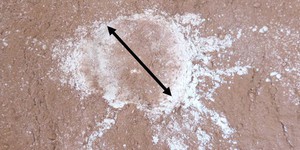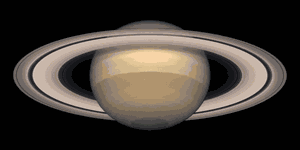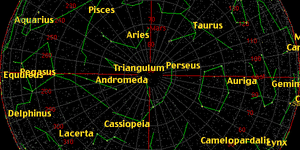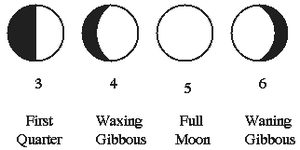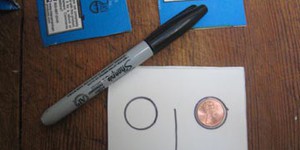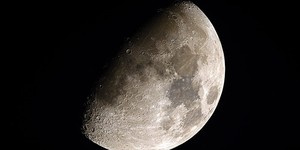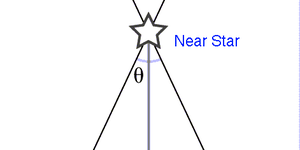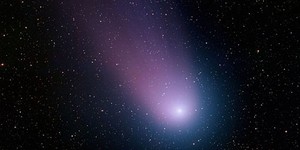Second Grade, Astronomy Science Projects (10 results)
Astronomy is science that will challenge your imagination. How many stars in a galaxy? How many galaxies in the known universe? How many strange worlds are out there on other planets, orbiting other stars, and what are they like? Is there life on planets besides Earth? The distances are mind-boggling; the numbers are immense.
|
Select a resource
Sort by
|
Have you ever heard someone say that the moon is made of cheese? Even though the craters on the surface of the moon resemble holes in Swiss cheese, we know that this common myth is not true. Find out how craters are formed and why they are different sizes by doing this simple science project.
Read more
Featured
Have you heard that garlic powder is supposed to inhibit the growth of bacteria? Which do you think would make a better disinfectant: a solution of garlic powder or a solution of bleach? This project shows you a straightforward way to compare the effectiveness of different disinfectants (or other antimicrobial agents), by measuring zones of inhibition on a culture plate.
Read more
Saturn is a unique planet because of the many beautiful rings surrounding it. How are all of those rings made? Why is each ring unique?
Read more
New
Many individuals who are blind or visually impaired use canes to navigate their surroundings, using their sense of touch to detect obstacles. What if you could create an electronic cane that emits an audible warning before coming into contact with an object? This project allows you to do just that by incorporating an ultrasonic distance sensor and a buzzer to alert the user of approaching obstacles. You can customize the cane by adding additional features or altering the design, such as using a…
Read more
Do you ever wonder how pirates sailed the seven seas? The two most important things a pirate could have (besides a parrot and big hat) were a compass and an accurate watch. Ancient navigators didn't know about compasses, so how did they know where they were going? Could they have used the stars to know which way to go?
Read more
Everyone loves looking at the full moon, but are these nights the best time to go stargazing? Can the moon interfere with certain astronomical observations?
Read more
How do astronomers collect stardust? They design and build satellites that are launched into space to collect particles on specially designed panels. Satellites can be sent to orbit around an object of interest: a planet, moon, or comet. In this experiment, you can build your own mini satellite and use it to collect some pretend stellar debris. If you simulate an asteroid impact, how much stellar dust will your satellite collect? Will placing your satellite at different "orbital" distances from…
Read more
New
Remembering to take medicine at the right time can be hard, especially if you need to take multiple medications at different times of day. It might not be a big deal if you forget to take your daily multivitamin, but for some people, forgetting to take medication at the right time can be dangerous. What if you had a device that could not only set off an alarm at the right time, but also automatically dispense the right pills for you? In this project, you will build an automatic medicine…
Read more
Do you like to look up into the night sky? There are so many stars, it can be mind boggling! Some ancient people marked time by the changes in star patterns. We still use changes in constellation patterns to mark astronomical time. Do constellations change more in one hour, one day, one month, or one year?
Read more
Sometimes a full moon can be so bright, you can walk around in the dark without a flashlight. How much brighter is a full moon than the other phases of the moon? How is the brightness of the moon measured?
Read more
One of my favorite things to do when I was a kid was to go outside and look at the stars. As an adult, I moved to a major city and the stars seemed to vanish from the sky. Where did they go?
Read more
Do you enjoy going stargazing? In a good location on a clear night, you can see a huge number of stars twinkling in the night's sky. Have you ever wondered how far those stars are from us? Ancient astronomers actually discovered a way figure this out, measuring the distance from Earth to faraway stars. How did they do it without modern technologies? In this astronomy science project you will find out by exploring the link between the distance of an object and perspective (also known as…
Read more
Comets—big lumps of rock, ice, and frozen gases that orbit the Sun—are among the most amazing
heavenly objects seen in the night sky. The glowing tail behind the comet's nucleus inspires wonder.
But did you know that a comet's tail is evidence that it's melting? As a comet passes by the Sun on
its orbital path, it starts to melt. But do bigger comets melt faster than smaller comets? In this
astronomy science project, you will investigate how the size of the comet affects the…
Read more
|
Explore Our Science Videos
Change the Reaction Rate of a Foaming Reaction
Transform Yogurt into Spheres With Reverse Spherification
Two-Stage Balloon Rocket Lesson Plan

